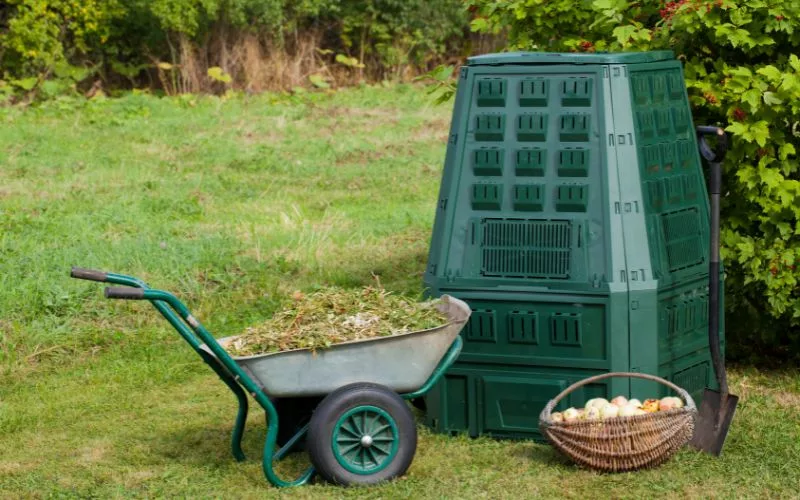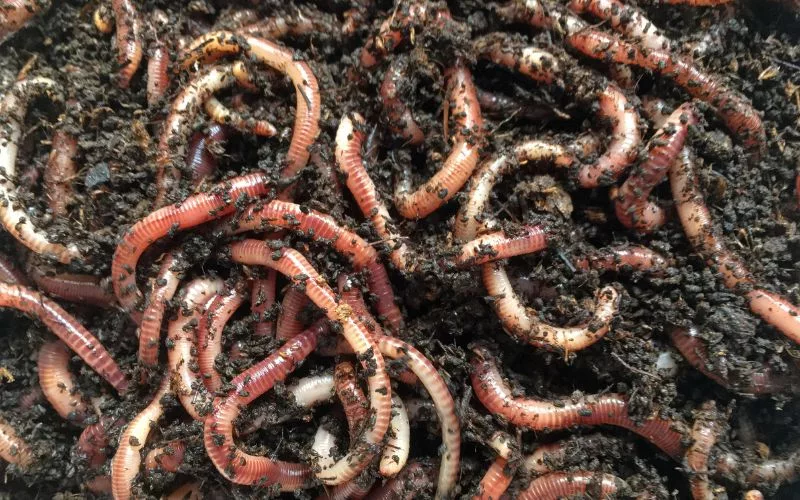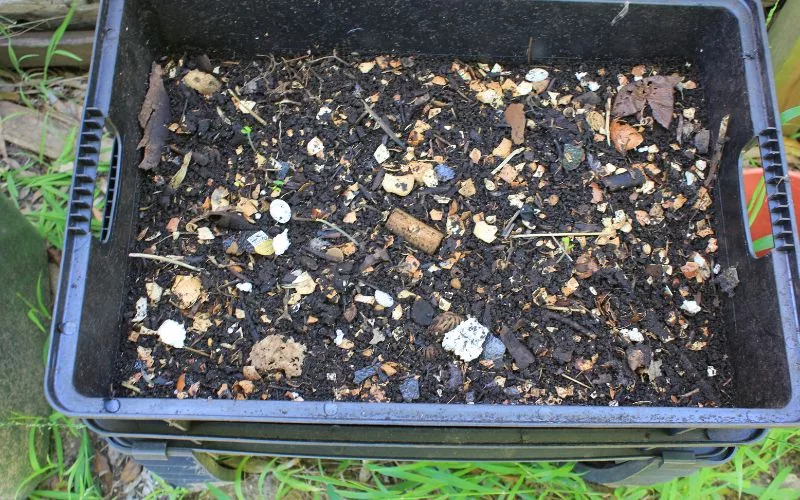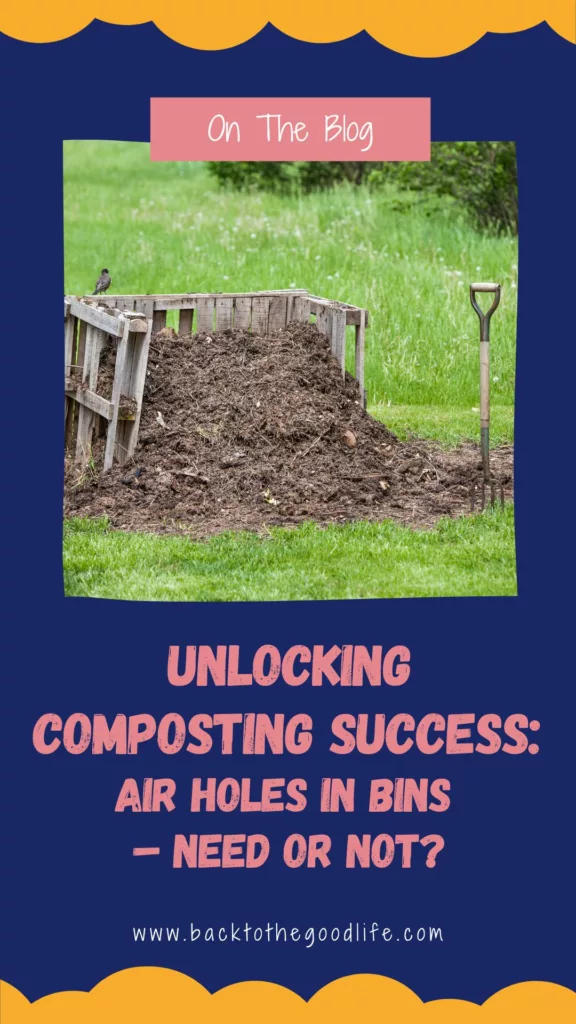Unlocking Composting Success: Air Holes in Bins – Need or Not?
Just a heads up, this post contains some affiliate links. That means that we earn a small commission if you buy the product at no extra cost to you. That allows us to continue to research and share interesting articles with you. :)

If you’re like us and enjoy gardening or reducing your food waste, composting might be on your mind. When I first started composting, we were overwhelmed with different opinions and advice about whether or not air holes were necessary for my composting bin. It took us a while to sort through the information and determine what would work best for us.
In this article, we’ll explore the role of air in composting, the debate around air holes in composting bins, and provide some tips on how to ensure the success of your composting efforts.
So, whether you’re just starting or a seasoned composter, read on to learn more about unlocking composting success!
Does A Compost Bin Need Air Holes?
The question of whether or not a compost bin or pile needs holes is a matter of debate among gardeners and compost enthusiasts.
Some people say that air holes are necessary to ensure that the microorganisms that break down organic matter get enough oxygen. In contrast, others suggest compost bins without air holes can still provide enough oxygen through natural convection currents.
Ultimately, whether or not you need air holes depends on how your composting system is set up and what you prefer.
Whether you have air holes or not, it’s important to keep a balanced environment for the microorganisms that break down the organic matter. This means ensuring the compost has the right amount of moisture, keeping the carbon-to-nitrogen ratio in check, and mixing the compost often.
The Importance of Air in Composting

To understand the role of air in composting, we need to know what composting is.
The transformation of organic waste, such as discarded food and yard trimmings, into a nutrient-dense soil supplement, is accomplished through a natural process known as composting.
This process is facilitated by microorganisms, such as bacteria and fungi, that thrive in oxygen.
When these microorganisms consume organic matter, they release carbon dioxide, water, and heat. The heat generated by composting helps break down the organic matter, and the carbon dioxide and water are released into the air.
However, if there is not enough oxygen in the composting environment, the microorganisms will switch to anaerobic (without oxygen) respiration, which produces unpleasant odours and slows down the composting process.
Air Holes in Composting Bins: The Debate
Now that we know the importance of air in composting let’s explore whether or not air holes are organic matter. They suggest that the compost will become compacted and anaerobic without air holes, leading to unpleasant odours and slow decomposition.
On the other hand, others argue that air holes are not necessary in composting bins. They suggest that composting bins without air holes can still provide enough oxygen to the microorganisms through natural convection currents, which draw air into the bin and circulate it throughout the compost.
Ensuring Composting Success
Regardless of whether or not you decide to have air holes in your composting bin, there are other factors to consider to ensure successful composting. Here are some tips:
Balance Your Composting Materials
For composting to work correctly, you must balance the carbon-rich (e.g., dry leaves, sawdust, shredded paper) and nitrogen-rich (e.g., food scraps, grass clippings) materials in your composting bin.
The ideal carbon-to-nitrogen ratio is 30:1, but it can vary between 20:1 to 40:1. Too much nitrogen can lead to a smelly and slimy compost, while too much carbon can slow down the decomposition process.

Moisture Content
Composting requires a moist environment, but not too wet. The ideal moisture level is around 60%, which feels like a damp sponge. If your compost is too dry, add water; if it’s too wet, add dry materials like leaves or sawdust.
Size of Composting Materials
The size of the materials you add to your composting bin is also essential. Smaller pieces decompose faster, so try to chop up your food scraps and yard waste into small pieces.
Mixing Your Compost
Mixing your compost helps distribute oxygen, moisture, and nutrients evenly. You can use a pitchfork or a composting tool to turn your compost regularly.
Temperature
Composting generates heat, and the ideal temperature range for composting is between 50 and 70 °C (C (120-160°F).
If your compost is not heating up, it might be too dry, wet, or compacted. If it’s too hot, it might be too wet, or you might need to add more carbon-rich materials.
So, Do You Need Air Holes in Your Composting Bin?
After considering the importance of air in composting and the debate about whether or not air holes are necessary in composting bins, it’s up to you to decide.
If you choose to have air holes in your compost bin, make sure they are not too large, as this can allow too much air into the bin and dry out the compost.
If you don’t want air holes, ensure your composting materials are well-balanced and mix your compost often to get oxygen to all parts of the bin.

Ultimately, the key to successful composting is not just having air holes, but understanding the factors that contribute to healthy composting and maintaining a balanced and healthy environment for your microorganisms to thrive.
Conclusion
Composting is a fantastic way to reduce food waste, improve soil health,
and reduce greenhouse gas emissions.
While there is a debate about the need for air holes in compost bins, the key to successful composting is maintaining a balanced environment for the microorganisms that break down organic matter.
FAQs
Can I compost meat and dairy products?
- Meat and dairy products should not be added to a home composting bin, as they can attract pests and slow down the composting process.
Can I compost pet waste?
- Pet waste should not be added to a home composting bin, as it can contain harmful bacteria and parasites.
How long does composting take?
- Composting can take anywhere from several weeks to several months, depending on the conditions in your composting bin and the size of the materials you are composting.
Can I use compost in my garden?
- Yes, compost is an excellent soil amendment for your garden, as it provides nutrients and helps improve soil health.
Can I use compost on my houseplants?
- Yes, you can use compost on your houseplants, but make sure it’s well-aged and has a pleasant earthy smell before using it to avoid burning your plants.
Back To The Good Life is a participant in the Amazon Services LLC Associates Program, an affiliate advertising program designed to provide a means for sites to earn advertising fees by advertising and linking to Amazon.com. We also participate in other affiliate programs which compensate us for referring traffic.






